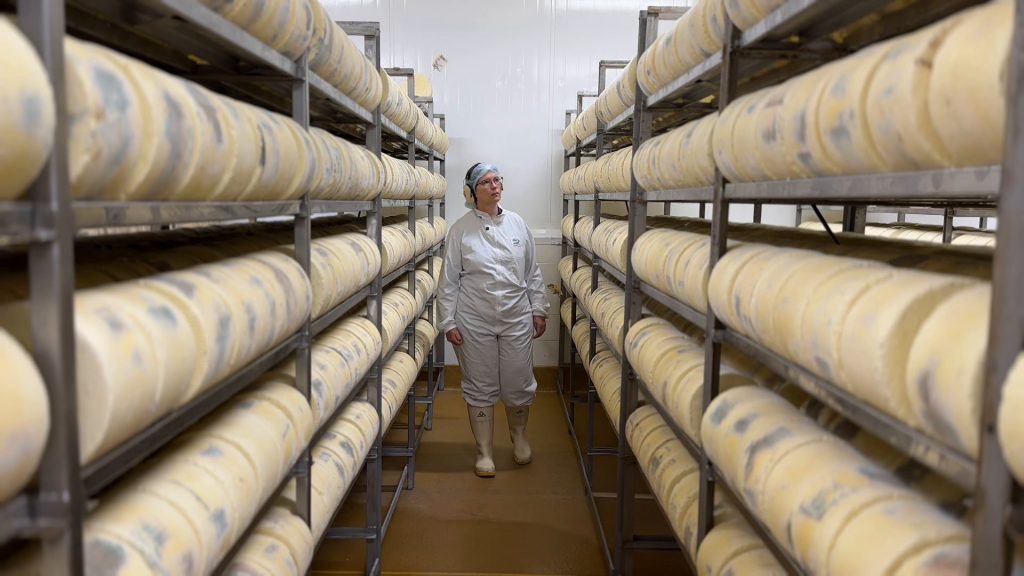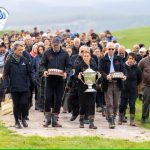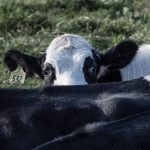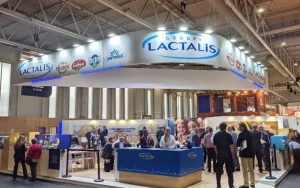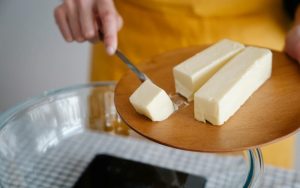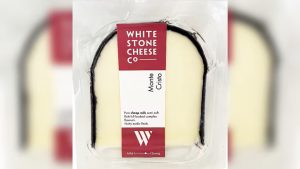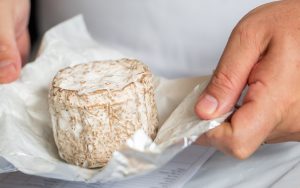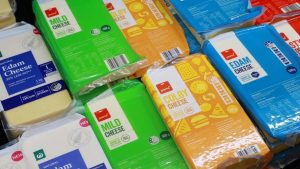
It was the first to export New Zealand butter to Britain; the country’s first concrete power pole was erected here and New Zealand’s first tar-sealed road was laid on Bridge Street, between High Street and Railway Street, to be precise.
But it’s also won plenty of firsts for its cheese.
“It’s a hidden gem under the mountain,” said Cathy Lang.
Lang is a Master Cheesemaker at Fonterra’s Bridge Street dairy factory in Eltham.

Cheesemaker Cathy Lang. (Source: Seven Sharp)
“We make four or five different blue cheeses, four or five different yellow — or semi-soft/semi-hard — cheeses, feta, halloumi, wash-rind cheeses, and four or five different white mould cheeses. There are so many cheeses,” laughed Lang.
Among them are some you might not expect to find in Taranaki.
“Kāpiti Kikorangi Blue is our king of blue, really; it’s continuously winning awards in NZ and overseas.”
Despite the camembert, brie and blue cheeses bearing the name Kāpiti, they are hand-crafted at the Eltham site. It’s the same for many Mainland soft cheeses — they, too, are Taranaki-made.
The Bridge Street creamery has been in operation since 1919. In the 1950s, it began making speciality cheeses destined for cheeseboards rather than sandwiches. Along the way, it notched up another first for Eltham, producing New Zealand’s first blue cheese— created from the now famous Eltham blue mould.

Eltham blue mould. (Source: Seven Sharp)
“It’s grown on-site from locally made bread from Yarrows. It’s Penicillin Roquefort, originally from France. It was found in the caves hundreds of years ago. And we’ve been growing our strain here since 1951.
“That’s our unique selling point: We are growing our own variety of blue mould here.”
This secret ingredient is so essential there is a provision should anything untoward happen to it.
“We do have a mother culture in Palmerston North, in case that happens,” said Lang.
“We keep it in a secret location.”
The cheeses are all made using traditional methods. Makers stir curds in large vats, turn maturing cheeses by hand, and even keep mould growth consistent by lightly rubbing the surface of each cylindrical creation by hand.
“They’re rubbing off the mould growing on the surface, so it doesn’t get too thick and furry. So we’re creating a firm, grey, fine rind on the cheese.
“When I visited France, they just let it go – you might have an inch of mould, but they’re not scared of the furriness. But we try to make it look more uniform and give it a good rubdown.”
The smells in the many maturing rooms range from sweet to mushroom-like. Some cheeses are white and fluffy, others are covered in blue/green fur, and hundreds are in every room.

(Source: Seven Sharp)
“Nothing to be afraid of; it’s all part of the natural process,” smiled Lang.
Her fascination with cheese began at home.
“I’ve been fascinated with moulds and funghi since I was little. They’re remarkable. They are tiny mushrooms on the cheese, helping to break down proteins and flavour them.
“It was a hobby at first. I enjoyed experimenting with all types of cheeses. At the time, I was working in the vet science industry, working in the lab. But I wanted to do something that focused on both farm animals and the land and also used science.”
She realised cheesemaking combined it all.
“It’s a science and a craft. You’re relying on bacteria, enzymes, and mould in the milk, but you’re also relying on a craft that’s thousands of years old.”
The Eltham site employs around 140 people – most of them local.

(Source: Seven Sharp)
Our factory is full of people from Eltham’s community. It’s made by people who have lived here for years and years.”
The whole region benefits from having a cheese factory in town. Their Cheese Bar is open to the public, offering cheeses the size of saucers and generous offcuts for a fraction of the retail price.
“We have lots of cheese for sale; you can find a good bargain.”
Lang admits it might be surprising to find a small town in Taranaki keeping the country stocked up, but with its volcanic soil and coastal plains, she believes Eltham is the perfect spot.
Up to 60 thousand litres of farm-fresh milk are delivered to the site daily, most of it from no more than 30 minutes down the road.
“If you’re a cheesemaker, you want fresh milk from pasture-fed cows. It’s what we do best in New Zealand. They’re not grain-fed and living in buildings. They’re out in the fresh air,” said Lang.
“We have the mountain and the water from the mountain, a continuous supply. And Taranaki gets plenty of rain, too. That land creates the milk in the animals, and the farmers are the caretakers of that land. We really appreciate having milk close by.”
It’s all about the land, the animals and the people.

(Source: Seven Sharp)
The Kāpiti Kikorangi blue cheese made at Bridge Street was the most awarded in the country.
And that doesn’t look to be changing.
“We’ve just heard we got two golds for Kikorangi Blue and our new Mainland Special Reserve chilli and garlic brie, which is a brand new cheese we created recently. And our premium Havarti got a couple of golds,” shared Lang.
“I still stop people at the supermarket. You hear people saying they want to buy a local cheese, and they’re looking at Kāpiti.
“It is local — it’s made just down the road.”
You can now read the most important #news on #eDairyNews #Whatsapp channels!!!
🇺🇸 eDairy News INGLÊS: https://whatsapp.com/channel/0029VaKsjzGDTkJyIN6hcP1K
